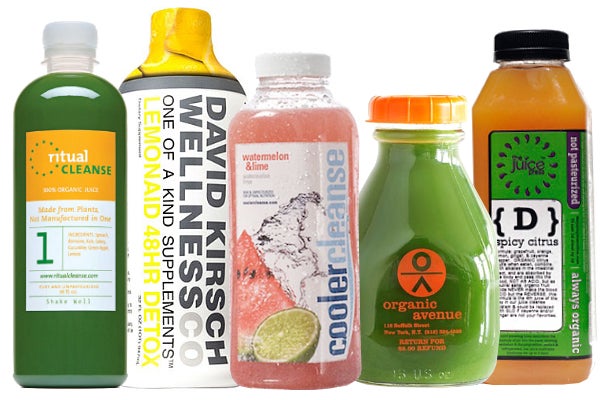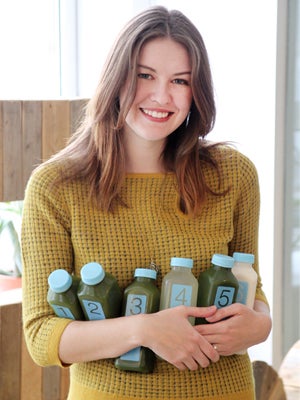
Every few years, a new wellness trend comes down the pipeline and suddenly everyone and their mother is on board. Remember the açai days? Or Atkins mania? Some of these health crazes have some actual science behind them, so they stick around for more than a hot second, while others blaze bright only to fizzle out underneath the harsh scrutiny of a fickle public.
Our latest obsession is the juice cleanse and it’s one of the most polarizing wellness trends yet. For those of you who have managed to escape the deluge of magazine editorials and blog posts, a juice cleanse consists of giving up soild food in favor of drinking fruit and vegetable juices for a series of days. The goal behind a cleanse is to reset your system and flush out any toxic build-up in your livers and kidneys.
One of the major questions posed by detractors is if our bodies actually need a cleanse. According to Meg Richichi, an integrative women’s health practitioner, that answer is a resounding yes. “In 2003,The Mount Sinai School of Medicine in New York conducted a study with the Environmental Working Group on the toxins found within the fetal umbilical blood. This study sadly indicates that most Americans have stored measurable levels of six major toxin groups that have been linked to everything from type 2 diabetes to cancer,” she says. “As I say to clients considering a detox — when the pool is murky, it’s time to clean out the filters!”
But while Richichi says cleansing can be good for you, that doesn’t mean they are all created equal. “Over the last 75 years, juice cleanses have been highly regarded as a simple and effective way to clear the body of toxins that can lead to an array of symptoms ranging from fatigue and headaches, to skin conditions like psoriasis. But the latest research has shown some major flaws in this approach. I don’t endorse juice detoxes beyond a few days — being on a juice cleanse for more than three days can significantly increase a wide variety of toxic symptoms, including headaches, gastro-intestinal problems, and skin breakouts. Unfortunately, most programs lack sufficient amounts of amino acids and enzyme-activating nutrients needed to excrete toxins from your body.”

If you’re looking for a quick reboot to kickstart your system and eat healthier, a 2-day juice detox can be a good fit for you, providing you choose one that delivers the vital nutrients you need. “When it comes to juices, there are important vegetables and culinary herbs which tend to assist your system on a short-term detox,” says Richichi. “Minimize juices that contain high amounts of fructose (apples, melons, carrots) — sugar tends to lower your pH and make your body acidic.”
Richichi says changing your pH can significantly reduce the enzymes in your liver necessary for detoxification, so increase the amount of chlorophyll-rich kale, spinach, celery, and parsley you are consuming — they contain high amounts of alkalizing minerals that positively affect the pH and help remove and deactivate toxins in the gastro-intestinal tract. Finally, Richichi recommends adding broccoli, brussel sprouts, cabbage, turmeric, ginger, and cinnamon to your diet, as they are rich in specific phyto-nutrients that aid in the detoxification of hormones.
If you’re detoxing to correct a more serious medical condition, Richichi says a juice cleanse isn’t going to help you get the results you need. Instead, she recommends metabolic detoxification, a “highly effective approach to liver and kidney cleansing that was originally researched by Dr. Jeffrey Bland.” It consists of a “medical food,” a highly-researched shake that has been shown in published clinical trials to assist your body in the excretion of toxins, and an elimination diet, whereby you slowly remove allergenic foods like wheat, eggs, and dairy from your diet. These foods are then reintroduced slowly back in to test for food sensitivity (rashes, fatigue, cramps).
“The effectiveness of this approach has been proven by numerous published studies,” says Richichi. “I personally have had a great deal of success using this approach with hundreds of patients over the past decade. Truthfully, most people are only 28 days from feeling healthier then they’ve ever felt before. It’s amazing how clients look younger and more vibrant after this type of cleanse.” Her fave comes fromMetagenics, because “they do extensive studies of their products on people. I’ve tried so many cleanses, but this is by far the best.” Of course, before embarking on any type of cleanse, talk to your doctor. All cleanses should be done under the careful supervision of a nutritionist, doctor, or holistic trainer.
Click HERE to read more from Refinery29.

Be the first to comment